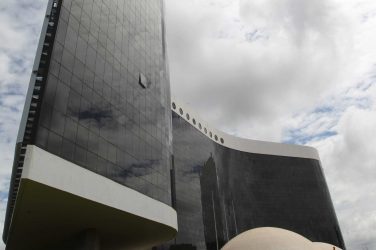 Brazil’s new president Michel Temer received strong support from Beijing when Chinese president Xi Jinping expressed confidence in Brazil’s ability to maintain stability and cooperation between the two countries, during a meeting on Friday with Temer in Hangzhou, the resort that will host the G20 summit.
Brazil’s new president Michel Temer received strong support from Beijing when Chinese president Xi Jinping expressed confidence in Brazil’s ability to maintain stability and cooperation between the two countries, during a meeting on Friday with Temer in Hangzhou, the resort that will host the G20 summit.
“China has great confidence in Brazil’s development prospects, as well as confidence in cooperation between China and Brazil,” said Xi, adding that “we must continue to treat each other as partners in development and strengthen cooperation, and make China-Brazil cooperation a highlight in unity and cooperative relations between developing countries.”
Temer told Xi that he wanted to reiterate “the need to maintain the solid relationship that has been built up over time”.
Brazil and China are both in the BRICS group of emerging economies that includes India, Russia and South Africa.

Earlier in the day Temer made his international presidential debut when he addressed a business forum in the Chinese commercial hub of Shanghai.
“Although we suffered from political and economic upheaval, as well as economic downturn, this page has been turned,” Temer said in his speech on Friday. “Brazil has put all the economic and political instability it suffered in the past few years behind us,” he added.
Temer also met with Chinese entrepreneurs in Shanghai on Friday morning and assured those who have signed deals that they will be “well protected” by the Brazilian law.
In a meeting with Shanghai mayor Yang Xiong, Temer witnessed the signing of nine agreements covering projects from infrastructure to agriculture and said that China was now “Brazil’s most-needed cooperative partner.” Brazilians “need China’s support, we need China’s cooperation,” he added.
On Thursday, before Temer arrived in Shanghai, the Chinese government had anticipated it trusted Brazil could retain national stability and a development and continue playing a significant role in regional and international affairs.
“China and Brazil are emerging markets, we are strategic partners and our relations have grown in recent years,” said Foreign Affairs spokesperson Hua Chunying adding Beijing has confidence in Brazilian institutionalism.
Demonstrations
Talking to reporters in China about the situation in Brazil, Temer said he sees no contradictions in the national reunification and pacification mentioned in his addresses and the protests staged in several places in Brazil against his government.
“The message of national reunification and pacification I send is not meant for personal benefit, but the benefit of Brazilians. I sense that this is what Brazilians want.
“Those who rise in protest, like those in one or other petty movement, are always a very small number of people. They’re not the ones who have followed most Brazilians,” Temer told journalists accompanying him on the trip.
With bombs and pepper spray, the Military Police once again dispersed protesters gathered in São Paulo on Thursday, September 1. Demonstrators were rallying for Michel Temer’s ouster and against the loss of social rights.
In a street rally, protesters walked down a number of thoroughfares in the city. The police prevented marchers from reaching the headquarters of the PMDB, the main party in the ruling coalition.
Demonstrators were often heard shouting “Deborah here,” in reference to Deborah Fabri, a student from the Federal University of ABC who lost the sight in her left eye during a rally the previous, after being hit by shrapnel or a rubber bullet.
The activists also chanted “Diretas já” (“Direct elections now”) the well-known protest slogan from the 1980s, as well as shouts of “not a single right lost,” and “Temer out.”
Since early this week, at least three São Paulo demonstrations against the removal of former President Dilma Rousseff and Temer’s inauguration have been ended by police actions.
Reaction to Venezuela
The impeachment process that led to the removal of Dilma Rousseff from office on Wednesday, August 31, increased the gap among the continent’s governments.
While the U.S. said that the definite ousting of the now-former president of Brazil followed constitutional proceedings, the so-called Bolivarian governments – Venezuela, Ecuador and Bolivia – reacted by calling their ambassadors back.
Venezuela’s action had an immediate reply from the Michel Temer administration. In a statement, Brazil’s Ministry of Foreign Affairs said that Venezuela’s attitude “is conspicuously against the principles and objectives of the Latin American integration.”
The Brazilian ambassador in Caracas, Ruy Pereira, was called for consultations. Brazil is also planning similar measures regarding Quito and La Paz.
Washington praised the solid Brazilian institutions and reinforced the respect for democratic rules. “As the two biggest democracies in the hemisphere, Brazil and the United States are committed partners. The U.S. will cooperate with Brazil to take on themes of mutual interest as well as the pressing challenges of the century.”
Similarly, the Argentine government published a statement in which it said that it respects the impeachment process and will continue to work for integration with its “sibling country,” respecting human rights, democratic institutions and international laws, as well as the effort to strengthen Mercosur.
Since the beginning of the process, Argentine President Mauricio Macri has shown full support for the Temer administration. In May, Argentina was the first country to receive José Serra as Brazil’s Minister of Foreign Affairs. Temer is likely to visit Argentina at the beginning of October.
The Chilean government said that it has “respect” for the Brazilian senate’s decision. Likewise Paraguay also said it respects Brazil’s sovereign institutions decisions and expects to keep working for integration with its large neighbor.
After the impeachment of Rousseff was approved, Rafael Correa, the President of Ecuador, said that he would call his ambassador in Brazil back and described the process as an “apology for treason.”
Later, the government of Nicolás Maduro repeated the statement and called the whole process a “parliamentary coup.”
Mercopress









